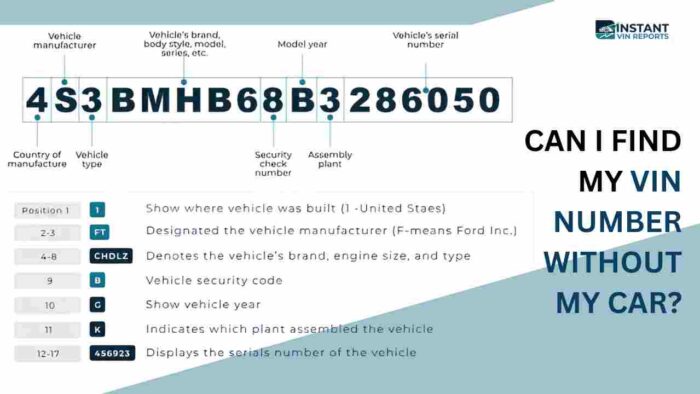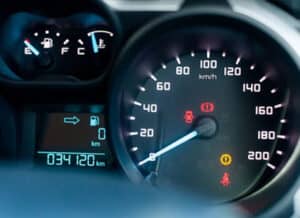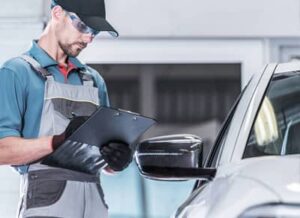Sometimes, you wonder why people ask how to find my VIN number online without my car. Well, you can’t rule this out in certain situations, like when the car is stolen or far from your reach.
Nevertheless, finding your VIN number without your car. shouldn’t be a challenge. While you can easily spot the VIN on the car by checking the dashboard, near the doorjamb, or even hidden under the car’s hood, you can also find your VIN without your car by checking other places discussed below.
So let’s find out.
What is a VIN Number?
A VIN (Vehicle Identification Number) is a unique code assigned to every car by the manufacturer. It consists of 17 characters, which include numbers and letters. Each VIN contains valuable information about the vehicle’s make, model, year, and country of origin. This VIN serves as the car’s fingerprint, so two vehicles cannot share the same VIN.
By using a VIN check tool, you can view the vehicle history and past records like previous owners, accidents, theft, title information, and more. The window sticker lookup by VIN tool also allows you to access detailed specs, features, options and packages, original MSRP and more.
READ ALSO: How to Verify Engine by VIN Number
How to Find My VIN Number Without My Car
You don’t always need to be near your vehicle to locate the VIN number. Often, you can find it on important documents related to your car. Some documents you can check are:
Insurance Cards
Your insurance card typically displays the VIN. If you have access to this document, you can easily retrieve the number. Just look for a section labeled “Vehicle Identification Number.” This is often one of the quickest ways to find your VIN without needing physical access to the vehicle.
If you have digital insurance, you can easily access your card through your insurance company’s app or website. If you can’t find your card, contacting your insurance agent can help. They can provide your VIN over the phone or through email.
Loan Papers
If you financed your vehicle, your loan paperwork will include the VIN. Check the loan agreement or any statements from your lender. They often print the VIN on these documents. If you have digital copies, just search for the term “VIN” in the document to locate it quickly.
If you cannot find your VIN number on the car or vehicle documents, you can also check places like the driver’s side dashboard, door frame, or even the window sticker label, which often displays important vehicle details.
Repair and Maintenance Receipts
When you take your car for service, mechanics often write the VIN on receipts. If you’ve kept your maintenance records, check them for the VIN. This information is valuable when maintaining your car’s history. If you can’t find the receipt, many shops keep digital records. A quick call to your mechanic might just yield the VIN you need.
Contacting the Dealership
If you purchased your vehicle from a dealership, reaching out to them is another option. Most dealerships keep records of all vehicles sold. The dealer can provide you with the VIN if you give them some information about your purchase; includes your name and the date of purchase. It’s a simple process, and they usually respond quickly.
READ ALSO: How To Decode a 13 Digit VIN Number (Step by Step Guide)
Find Your VIN Number Online Using License Plate Lookup Services
If you’re still struggling to find your VIN, consider using online resources. Various websites offer VIN lookup services. One option is Instant VIN Reports. This site can help you find your VIN using the plate by performing a license plate lookup.
Just enter the plate number, and it provides detailed vehicle information. It’s a convenient way to access what you need without having the car in front of you. You can also decode the VIN and learn about your vehicle’s specifications in a few seconds.
Why is the VIN important?
The VIN holds significant importance for several reasons:
- Vehicle History Tracking: A VIN allows you to access comprehensive vehicle history reports using a VIN number check tool. These reports can reveal past accidents, title changes, mileage records, and any insurance claims made against the vehicle.
- Theft Recovery: In cases of vehicle theft, the VIN plays a critical role in recovery efforts. Law enforcement and insurance companies use the VIN to track stolen vehicles, increasing the chances of recovery.
- Insurance Claims: When filing an insurance claim for theft or damage, you must provide your VIN. This number helps insurers verify your vehicle’s identity and history, ensuring proper coverage.
- Recalls and Safety Issues: The VIN is essential for tracking recalls related to your vehicle. Manufacturers use it to inform owners about safety recalls that may affect their cars.
- Warranty Verification: If you need to file a warranty claim for repairs, the VIN helps manufacturers determine if your vehicle is still under warranty and what repairs are covered.
- Registration and Title Transfers: The VIN is required to register your vehicle and transfer its title when sold or inherited. It ensures that all ownership records are accurate and up-to-date.
- Compliance with Regulations: Many states require that vehicles have a visible VIN for compliance with local laws and regulations related to vehicle ownership.
Do I need a VIN Number to Get Insurance?
Yes, you typically need your car VIN to get car insurance. The VIN provides detailed information about your vehicle, which insurers use to determine coverage and rates. Without a VIN, insurers can’t fully assess the car’s risk or issue a complete policy.
Conclusion
With the various methods discussed, finding your VIN without having the car on hand should not be challenging. You can easily track down the VIN from checking documents, contacting your dealership or even performing a license plate search (US only).
If you have a classic car and want to look up the VIN, accurate classic car VIN lookup tools like Classic Decoder service is a great resource to help you locate the VIN efficiently.
Frequently Asked Questions
What is the difference between a VIN and a license plate number?
A VIN is a unique identifier assigned to each vehicle and doesn’t change. A license plate number, on the other hand, is issued by a state and can change if you move or transfer ownership.
How can I ensure the accuracy of my vehicle’s VIN?
Always double-check the VIN against your documents. Make sure it matches what is on your insurance, registration, and title.
Can VINs help in tracing the history of previous owners?
Yes, the VIN provides access to the vehicle’s history, including previous owners, accidents, and repairs. A VIN check can reveal important information. For a detailed history, use our simple tools and get a report.
Are there any common misconceptions about VINs?
Many people think a VIN is just a random set of numbers. In reality, it encodes specific information about the vehicle’s manufacturer, model, and year. It’s essential for tracking recalls and ownership history.











